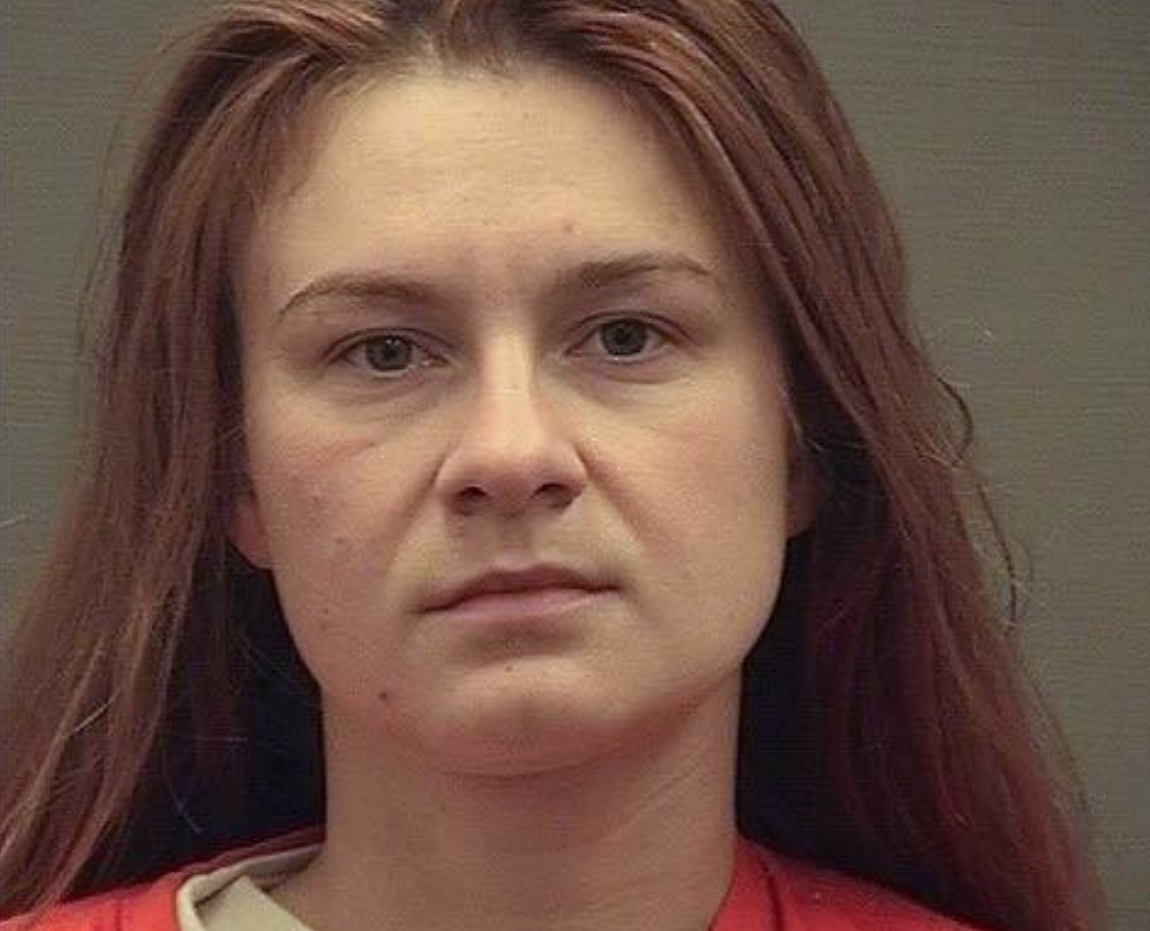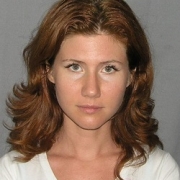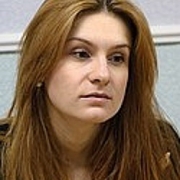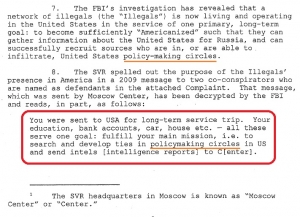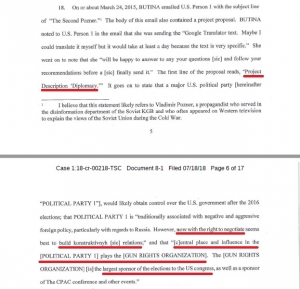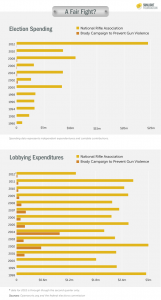The Dispute over the Accusation Maria Butina Is a Spotter Distracts from Clear Case She Should Be Sent Home
Let me start by saying that I think the government should put Maria Butina, who is currently scheduled to be sentenced Friday, on a plane and send her home. The impression given when she signed a plea deal is that she might get a six month sentence. She has cooperated fully — the government is submitting a sealed downward departure letter describing her cooperation — and the period of her cooperation has been extended a bit. She has already been detained nine months.
Even according to the government’s own sentencing memorandum, the defense can and should compellingly argue that she has served a fair sentence. The most directly relevant case the government points to in its memo is that of Evgeny Buryakov, one of the guys who tried to recruit Carter Page.
In United States v. Buryakov, No. 15-CR-73 (S.D.N.Y.), the defendant pled guilty to violating § 951, stemming from an agreement to take actions within the United States at the direction of a Russian government official. The parties agreed, pursuant to Fed. R. Crim. P. 11(c)(1)(C), to a sentence of 30 months of incarceration. The court accepted that agreement and imposed a sentence of 30 months.
Buryakov pled guilty, but after far more litigation, including some CIPA hearings. He did not (at least according to the public record) cooperate with the government at all. And while the government dropped some of their claims, they considered Buryakov as an undisclosed SVR Agent, someone who operated clandestinely as a trained professional, as compared to Butina, whom the government doesn’t claim is a trained intelligence officer and who operated overtly. The comparison with Buryakov, then, makes a solid argument that Butina should be shipped home immediately. She started cooperating early and the government deems her cooperation valuable. And the government agrees she’s not the same kind of clandestine spy that Buryakov was.
That, to me, seems like a slam dunk case supporting a just outcome, which would be for Butina to be on the next flight home.
All that said, I have a very different opinion than Butina’s defense attorneys on the government’s submission of a declaration from the former Assistant Director of FBI’s Counterintelligence Division, Robert Anderson Jr., accompanying their request for an eighteen month sentence. After the government submitted the declaration (which they claim they warned the defense about on April 10, though the defense complains they only learned Anderson’s identity on the April 17), the defense asked for it to be stricken, complaining that the government is submitting a new, unsubstantiated case.
Again, I think the government’s request for an eighteen month sentence is bullshit, given the facts that both sides agree on and the precedents they cite. And the defense is right about some of their complaints about Anderson’s declaration — most notably, that it doesn’t cite which case materials he relies on to make his declaration suggesting Butina functioned as a spotter for Russian intelligence.
But their complaints about the substance of Anderson’s declaration are made in isolation from the government’s sentencing memo. As such, they don’t address what I think are weaknesses of their own sentencing memorandum. Those weaknesses, put together with the claims the government and Anderson make, do leave the impression that the defense is trying to downplay Butina’s enthusiasm for a project that (exhibits presented by the government show) she believed would increase her own influence within Russia.
The defense explanation for Butina’s gun rights activism comes off as complete BS.
She returned to the issue of gun rights. Her father had taught her how to use a hunting rifle as a child, a hobby they both shared. Her gun rights advocacy had also been one of the most popular issues in her campaign for local office right after graduating, and she already started a small gun rights group in Barnaul. Using social networking websites, Maria was able to form a formidable group in Moscow, organizing demonstrations and protests, particularly on the issue of personal safety. Based on her admiration of western democratic freedoms, a group name was chosen: the Right to Bear Arms.
Notably, gun advocacy in Russia has little to do with gun advocacy in the United States. A hundred years ago, during the Russian Civil War, guns were confiscated by the precursor of the Soviet Union. With few exceptions, Russians today cannot carry or own most firearms. Yet, the issue of gun rights was important to Maria as a matter of self-defense, when for every five people murdered in the United States, there were fifteen murdered in Russia.1 For Maria, gun rights— however unpopular—was a means for personal safety, and Maria sought support for her advocacy from across the political spectrum. It didn’t matter to her whether the person was liberal, conservative, in government, or oppositional, and she had a slogan written on her office door that read “anyone who supports gun rights may come in, but you leave your flag behind.”
[snip]
As Maria’s group membership multiplied, she planned an annual convention for fall 2013, with similar gun-rights organizations from around the world invited to Moscow for the meeting. Torshin gave Maria the contact information for David Keene (a former NRA President), who Torshin met on a prior trip to the United States. Because Torshin did not speak or write English, Maria reached out to Keene to invite him and any other NRA members for her group’s annual meeting. Keene accepted the invitation and asked Paul Erickson to accompany him. Maria was elated.
This passage, and other parts of the memo, can’t decide whether Butina’s is a strictly Russian phenomenon or a way to solidify her ties with America. It admits Russia doesn’t support gun rights but doesn’t explain, then, the great support she got.
And the defense again claims that the government dropped all accusations she used romance for recruiting, except that’s not true. They never dropped the suggestion her relationship with Erickson was utilitarian — a claim bolstered by Butina’s willingess to cooperate against him and enthusiasm for returning home. And the defense discussion of the relationship between the two also rings hollow (as did their earlier efforts to make it look authentic), especially as it related to her project, Description of Diplomacy (a copy of which the government entered as an exhibit).
She also wished to be in the same hemisphere as her romantic interest. So Maria and Erickson explored both educational and business opportunities for her. This is the genesis of the Description of the Diplomacy Project proposal referenced in the Statement of Offense.
If the only reason she came to the US was to be with Erickson, grad school by itself would have been adequate.
The exhibits included — even before you get to the Anderson declaration — are why the government’s sentencing memo comes off as more credible as to the substance. Perhaps most compelling are Butina’s repeated concerns that she and Aleksandr Torshin remain the people with the handle on the Russian government’s exploitation of the NRA and National Prayer Breakfast as influence channels.
Following the Gun Rights Organization trip to Moscow, the defendant and the Russian Official discussed the need to “hold the spot” now that “everyone has realized that [the Gun Rights Organization] is a valuable contact,” and she noted that there will be “attempts to seize the initiative.” Exhibit 2. Butina has since confirmed that she was worried about others within the Russian government or a political group or activist noticing that the contacts she had built with the Gun Rights Organization were valuable and cutting her and the Russian Official out of the loop.
[snip]
According to a document written by Butina after the event, in the lead-up to the National Prayer Breakfast, she and the Russian Official were promised a private meeting with the President of the United States by one of the organizers of the event. A copy of this document is attached hereto as Exhibit 8. This promised meeting never materialized. After the event, and Butina’s and the Russian Official’s failure to meet privately with the President, she was worried that another Russian national (i.e., not the Russian Official) would attempt to seize the initiative, as demonstrated in her Twitter conversation with the Russian Official:
Butina: It would be good if you could talk directly with the MFA or the administration. Before [Russian national who attended the breakfast] worms his way in there.
Russian Official: Everything will be fine. I already conducted the necessary informal consultations on Saturday. I just don’t want to overload Twitter, which is read.
We need to build relationships with the USA, but there are many who oppose this! . . . According to Butina, this other Russian national referred to was another member of the Russian government whom Butina feared would overtake her and the Russian Official as the primary Russian point of contact for the National Prayer Breakfast.
If all this networking was exclusively about being close to Erickson, why would Butina care so much that she and Torshin were viewed as the brokers of these links to the US? And this kind of competitive oligarch-focused influence operation is the modus operandi we’ve seen from much of Russia’s efforts in recent years.
That’s why — caveats about the form of the declaration, which Butina’s lawyers will undoubtedly emphasize if sentencing happens Friday — I don’t have much problem with Anderson’s explanation of how the Butina collected could — and likely was — useful for Russia. I also don’t think the evidence presented is — as the defense claims — all that new (indeed, some reporters are claiming some of the details — such as that Butina claimed to have input over who would be Secretary of State — are new, but they are not).
I do recognize it’s probably an attempt to parallel construct stuff FBI knows via other channels that — by having an ostensible outsider deliver — they can make intelligence claims in an unclassified setting. As such, it surely serves as an opportunity for those close to the FBI to lay out a counterintelligence claim about Russia’s methods, generally, as it was interpreted as by Andrew Weiss. But neither of those things change the fact that what Butina did doesn’t compare to what Buryakov did, and by distinguishing those details from Buryakov, Butina’s lawyers could easily back their case it’s time to send her home.
I think prosecutors are being assholes for not letting Butina go. Holding her any longer is not going to serve as a deterrent to Russia, as they claim.
But that’s them about being asshole prosecutors generally (and, presumably, trying to use this case to boost their careers). Whatever the narrative about why Butina did what she did (and, again, the government’s is more credible at this point), the assertions made by both sides still only justifies sending her home.
Update: Judge Tanya Chutkan has denied this request, noting that she offered to give them more time to respond to it, but they didn’t take her up on it.
MINUTE ORDER as to Mariia Butina: Defendant’s 102
Motion to Exclude and Strike the Declaration of Robert Anderson, Jr. is DENIED. Defendant has had notice of the government’s intent to call Mr. Anderson as a witness or submit a Declaration from him since April 10, 2019. The court “may appropriately conduct an inquiry broad in scope, largely unlimited either as to the kind of information [the court] may consider, or the source from which it may come.” United States v. McCrory, 930 F.2d 63, 68 (D.C. Cir. 1991) (quotation marks and citations omitted); see also United States v. Beaulieu, 893 F.2d 1177, 1179 (10th Cir. 1990) (“[C]ourts have traditionally been allowed to consider all sources of information in formulating an appropriate sentence.”). The defense did not request additional time to prepare a rebuttal to Mr. Anderson’s Declaration, despite the court’s willingness to adjourn sentencing in order for it to do so. Therefore, the Sentencing Hearing will not be adjourned. Signed by Judge Tanya S. Chutkan on 4/25/2019.(lctsc3) (Entered: 04/25/2019)

